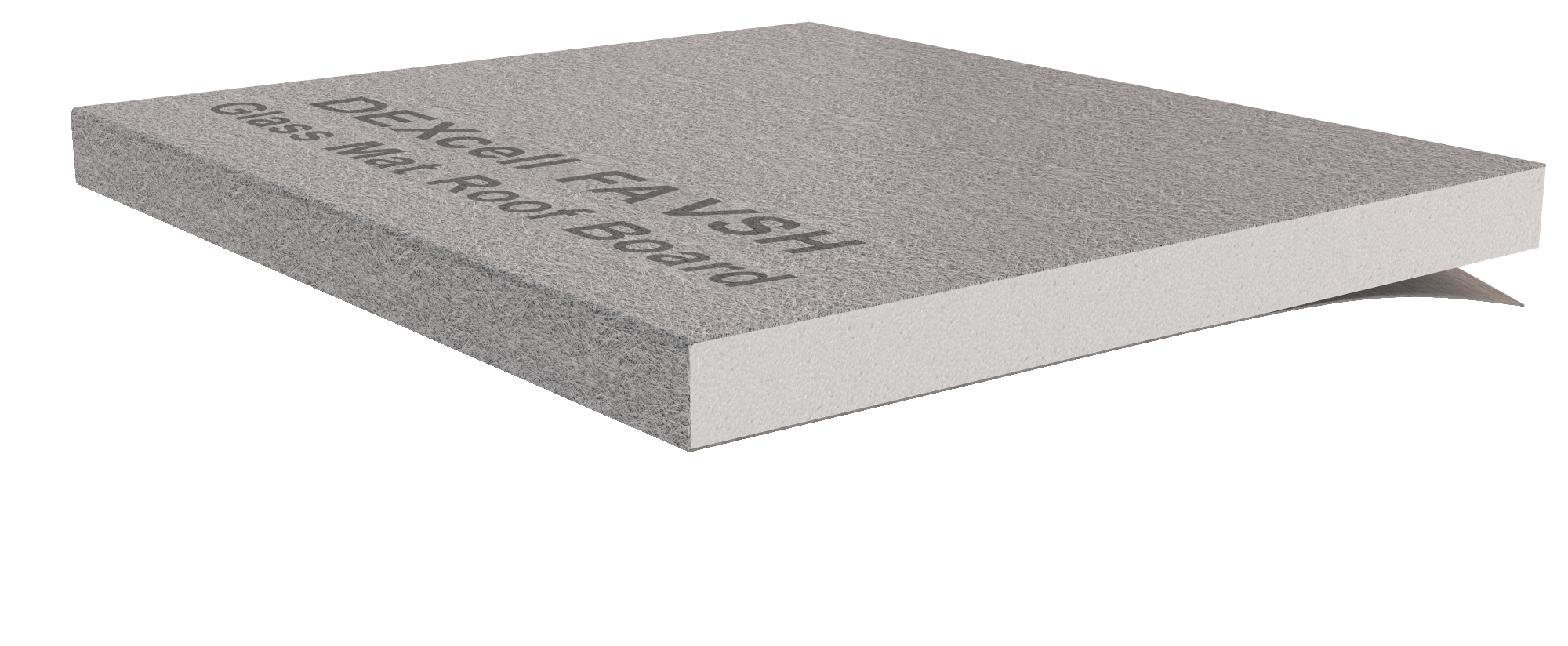 Roofing Systems
Roofing Systems
How DEXcell Roof Boards improve roof assembly thermal performance
Discover the benefits of building a heat sink barrier into commercial roof assemblies

It’s time to rethink roof assembly thermal performance beyond meeting R-value requirements. While resisting the conductive flow of heat is critical for many reasons, protecting the roof membrane from rapid and wide temperature fluctuations is equally important.
Commercial roofs face multiple sources of heat-related damage ranging from direct sun exposure and ambient air temperature to reflected heat and light from glass facades of adjacent high-rises. Adding more insulation isn’t always the right answer because it’s designed to stop the transfer of heat, keeping it at its source.
This article will explore how DEXcell® Roof Boards, manufactured by Gold Bond Building Products, LLC and PermaBASE Building Products, LLC, affiliates of National Gypsum Company, provide an essential heat sink barrier that could extend the life of the roof.
What happens when heat rises rapidly in a roof membrane?
Roofs are a key component of boosting energy efficiency in commercial buildings, and designers typically add more insulation to meet R-values prescribed by the energy code. Often, roof assemblies are constructed with a layer of rigid insulation directly under the asphalt or single-ply roof membrane. But that comes at a price, because insulation traps heat that can cause the roofing membrane to experience wide and rapid temperature fluctuations.
The temperature of the roof assembly can rise as high as 180 F, which causes the membrane material to rapidly expand and contract at a molecular level. The effect is similar to bending a paperclip back and forth — eventually the metal weakens and breaks.
Heat-related roof membrane damage may shorten the lifespan of the roof, resulting in costly repairs and potential for leaks. Resulting changes in the roof’s integrity include:
- Cracks
- Gaps at the seams
- Punctures
- Damage from maintenance workers walking on the roof
How to use DEXcell Roof Boards to reduce heat damage to commercial roof membranes
Sandwiching ½" or ⅝" DEXcell Roof Boards between the membrane and the insulation provides a heat sink barrier that protects the roofing membrane and insulation from rapid and wide heat temperature swings.
Here’s how it works: Heat absorbs and dissipates through the high-density gypsum roof boards to modulate heating and cooling, which helps keep the membrane at a more consistent temperature.

Modulating the temperature slows the single-ply roof membrane’s molecular movement, which can improve the overall life of the membrane.
Four DEXcell Roof Boards products can be used as heat sink barriers in commercial roof assemblies.
- DEXcell® Cement Roof Board is a lightweight option to provide support for the roof membrane.
- DEXcell® Glass Mat Roof Board is recommended for mechanically attached single-ply membranes, metal and fire/thermal barrier applications.
- DEXcell FA® Glass Mat Roof Board is recommended for fully adhered single-ply membranes, cold-applied modified bitumen, fluid-applied and metal systems.
- DEXcell FA VSH® Glass Mat Roof Board is recommended for areas prone to severe hail.
Heat-reflective windows on high-rises can contribute to roof membranes overheating in adjacent buildings
An additional consideration for roof designers is the effect of heat-reflective windows, if their building is near a glass-clad high-rise.
It has become more common for building codes to call for heat-reflective windows to help manage energy consumption and provide a comfortable interior environment. However, these windows can reflect significant light and heat onto adjacent roofs.
Adding DEXcell Roof Boards between the membrane and the insulation can provide a heat sink barrier to dissipate heat caused by reflective windows on adjacent buildings.
Help roof membranes last longer with DEXcell Roof Boards
Learn about the benefits of DEXcell Roof Boards for heat sink barriers and more.
Be the first to hear of new NGConnects blog posts by subscribing here for early access.
Related Blog Posts

How to protect your low-slope commercial roof from human impact
Learn how DEXcell products give roofs a stout surface that can st...
Read MoreRelated Podcasts

Episode 4: Understanding the ratings behind acoustical wall, ceiling and roof assemblies
Familiarize yourself with STC, IIC, CAC and OITC rating classes a...
Listen Now










